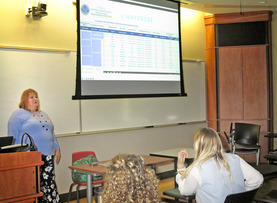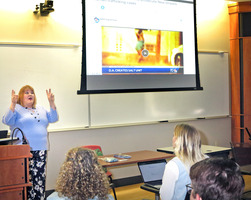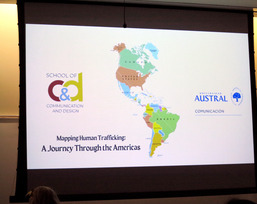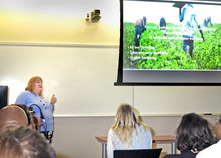
A platform that encourages healthy conversation, spiritual support, growth and fellowship

NOLACatholic Parenting Podcast
A natural progression of our weekly column in the Clarion Herald and blog

The best in Catholic news and inspiration - wherever you are!
Loyola elective exposes underbelly of trafficking
-

By Christine Bordelon
Clarion Herald
Sheri Lochridge Combs, senior program manager for human trafficking special populations at Covenant House New Orleans, knows what it takes to survive on the streets. Originally from Germany, she and her family moved to the U.S., and she ended up in foster care. At age 13, she became a teenage runaway until Covenant House offered the sense of family, stability and support system she needed to change her life.
Combs was the guest speaker Feb. 15 for students taking the new elective at Loyola University New Orleans, “Mapping Human Trafficking,’’ taught by visiting professor Ty Lawson. Combs not only gave first-hand experience but imparted what she sees and hears daily from clients who are alone and in survival mode.“Girls in high school, don’t they deserve a chance?” Combs asked students. “Human trafficking is rape. (Girls) are being raped all day, every day. … ‘No means no,’ no matter what your occupation.”
Covenant House has used grant funding to house and work with 686 clients over the past six years. The most vulnerable include the LGBTQ, Black and underserved male communities, Combs said.

About 40% of Covenant House’s human-trafficked clients identify as LGBTQ. Louisiana’s Human Trafficking Prevention program reported that the youngest victim was 9 months old, and the oldest was 70.“When people say this could happen to anybody at any age, that’s the truth,” Combs said. “No one is immune.”
COVID contributed to trafficking since more young people were online unsupervised, opening the doors to pimps grooming children into sex trafficking.
 Combs also explored another form of human trafficking: labor trafficking. Hurricanes lured immigrant workers here with the promise of jobs and money but, instead, they were labor-trafficked, treated harshly, housed in awful living conditions, not paid what was promised and had personal identifying documents confiscated.
Combs also explored another form of human trafficking: labor trafficking. Hurricanes lured immigrant workers here with the promise of jobs and money but, instead, they were labor-trafficked, treated harshly, housed in awful living conditions, not paid what was promised and had personal identifying documents confiscated.“They lived in fear and constant brutality,” Combs said, citing a specific case of a foreign national who was beaten and threatened when he asked for his paycheck. He escaped and called the FBI hotline.
Students were inquisitive
Among other topics, students asked Combs if Covenant House turned away clients, offered drug treatment or had statistics on the average length of stay (1-2 years).Working as a local television station intern, senior journalism student Alexis Horton heard about sex trafficking and runaways, but hadn’t humanized it.
“Taking this class opened my eyes that there is a lot more to their stories,” Horton, 22, said. “I want to know how to report this better, especially (about) kids.”
Freshman Gabriela Santos, 19, a mass communications major from Puerto Rico, said her understanding of human trafficking is much broader due to the course.
“Speakers are giving me a perspective that not every case of trafficking is the same,” Santos said.
That’s part of what Lawson hopes to achieve with the course developed over a year ago. Lawson, a Loyola graduate, is the Marion M. and John S. Stokes Jr. Visiting Professor in Race and Culture in the Media School of Communication and Design. He has arranged anti-trafficking speakers from police task forces in Houston and Miami and from the Houston Mayor’s Office of Anti-Trafficking.
Texas and Mississippi are among the top states for human trafficking, Lawson discovered, and Louisiana created the Governor’s Office of Human Trafficking Prevention a year ago.
Lawson earned a master’s in international media producing from New York University’s Tisch School of the Arts and has been an adjunct professor at ESRA International Film Schools. Lawson returned to New Orleans in 2021 after living in New York working for network morning shows during COVID. A Loyola classmate mentioned the Loyola opening just as Lawson was considering a career move.
Now teaching advanced reporting and this human trafficking elective, Lawson said he can offer students substance and real-world relatability.
“Through this project, students will raise awareness about the slavery suffered by vulnerable people around the world – and open eyes to the possibilities that the creative use of technology can bring,” Lawson said. “This class is about making media that matters.”
Loyola students, who partner with students from the Universidad Austral in Argentina, are assigned different countries, write papers, create videos and ultimately unveil an interactive map “that details the travels of people who are trafficked (across the Americas), addresses international rights and protocols in each country and hopefully spurs change to eventually better protect those who are trafficked.”
“I want students to understand how all this relates,” Lawson said. “There’s no one way someone can be trafficked. People think that trafficking is just sex trafficking, and it’s not. I showed them you could go to one of these cantinas where we go on Taco Tuesday, and the workers there might be trafficked.”
He considers trafficked people a forgotten population and hopes this course brings the issue to the forefront.
“I feel like this class has a bigger purpose,” Lawson said. “When we finish, I want this class to be seen nationally, if not internationally. I will push to make sure that will happen, even if I have to use my resources on ‘Good Morning America’ and the ‘Today’ show.”




